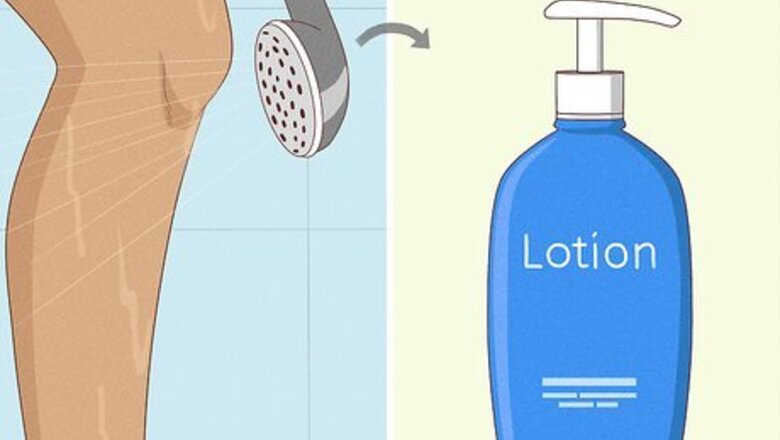
views
Apply moisturizer after every bath or shower.
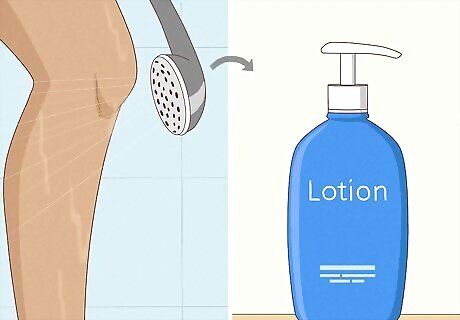
Ingrown hairs are more likely if you have dry skin. Apply moisturizer immediately after you get out of the bath or shower, when your skin is still damp. Then, allow it to dry and soak into your skin before you get dressed. If you have extremely dry skin, use a thicker moisturizer specifically formulated for your skin type. You can also use oil, such as coconut oil. If it feels greasy, only use it at night before you go to bed.
Use a sugar scrub 2-3 times a week.
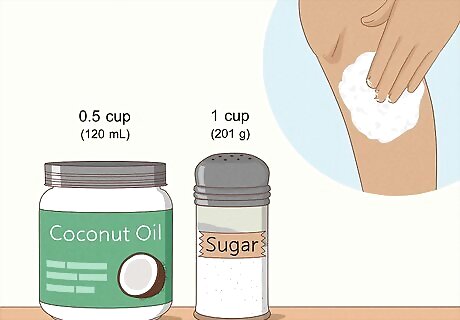
Mix 1 cup (201 grams) of sugar with 0.5 cup (120 mL) of coconut oil. This basic, simple scrub will help you slough off all the dead skin that can clog your hair follicles and make you more prone to ingrown hairs. Coconut oil also has fatty acids with disinfectant and antimicrobial properties to keep your skin clean and healthy. You don't have to stop with the basic ingredients of sugar and coconut oil. For example, you might add a few drops of your favorite essential oil.
Dry brush your skin once a week.
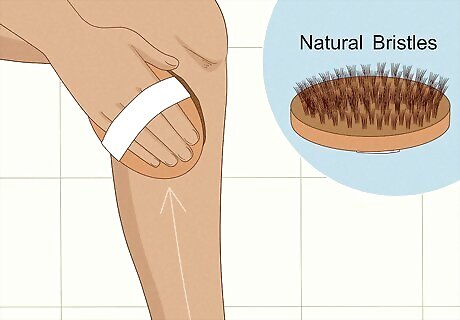
Dry brushing provides more comprehensive exfoliation. Get a body brush with natural bristles. Before you hop in the bath or shower, gently brush your skin in long, sweeping motions moving toward your heart. Be more gentle around more sensitive areas, such as your bikini line. It can feel kind of rough when you're first starting out with dry brushing. If you have sensitive skin and can't handle a brush, try starting with a washcloth. Dry brushing isn't a good idea if you have eczema because it can worsen that condition.
Exfoliate with salicylic or glycolic acid before waxing.
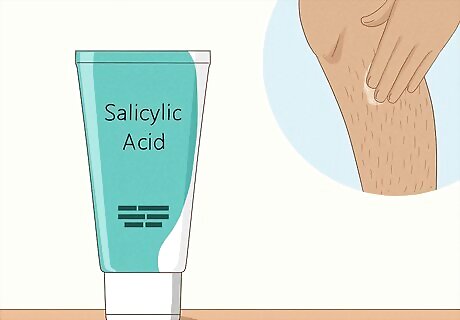
Buy over-the-counter salicylic or glycolic acid scrubs or lotions. These products are available online as well as in drug and discount stores. Since the acids gently exfoliate, you can use these products right before you wax to help prevent ingrown hairs. If you get a scrub, you'll usually use it in the shower, then rinse it off. You don't necessarily have to buy special skincare products. Aspirin is made from salicylic acid. Crush a couple of uncoated aspirin tablets and mix them with water to form a paste. Smooth it on your skin and massage it in, then rinse it off with warm water.
Wash the area immediately before waxing.
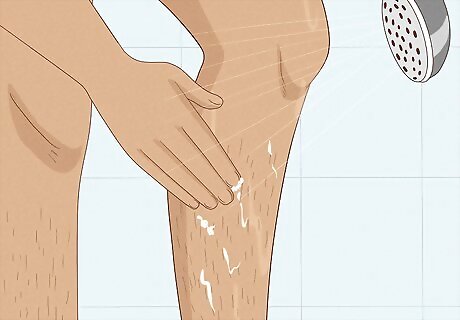
With clean skin the wax can grip the hair more easily to pull it out. Use a mild soap and warm water to gently wash your skin, then pat it dry. Don't follow up with any lotion or moisturizer—that defeats the purpose of washing your skin. Likewise, steer clear of soaps or shower gels that have built-in moisturizers. They can leave a residue on your skin that interferes with the grip of the wax.
Wax hair when it's 0.25 to 0.75 in (0.64 to 1.91 cm) long.
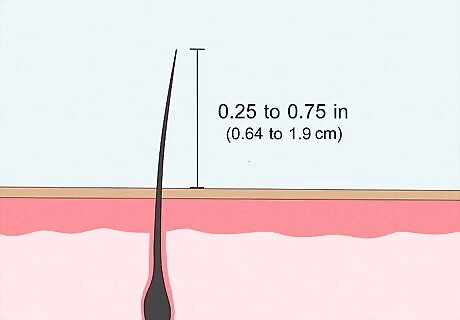
If your hair is longer or shorter, wax won't remove it effectively. If your hair is longer than 0.75 in (1.9 cm), trim it with safety scissors before waxing. The wax can't grip longer hair properly and you'll end up with an uneven result. Trying to remove longer hair also makes it more likely you'll end up with ingrown hairs. You're also probably less likely to get ingrown hairs if you get waxed by a professional rather than trying to do it yourself.
Apply a cold compress immediately after waxing.
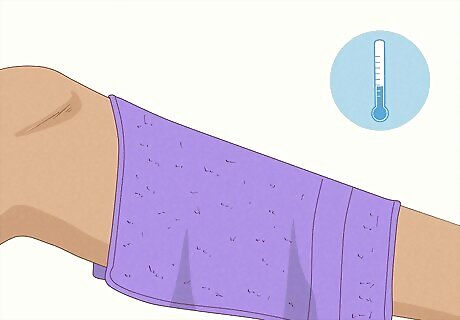
Soak a washcloth or hand towel in cold water and apply it to your skin. Make sure you wring it out well so it's not dripping all over the place. Leave the towel on your skin until it's no longer cool, then take it off. Waxing opens up your pores and hair follicles. Cooling them down helps close them up.
Use a baking soda paste to calm inflammation.
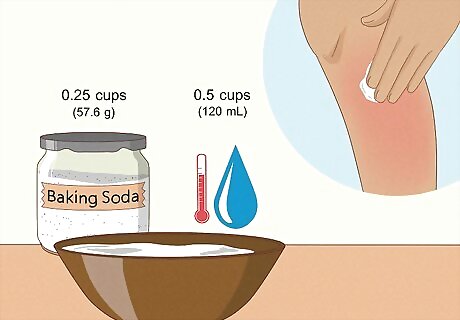
Mix 0.25 cups (57.6 grams) of baking soda in 0.5 cups (120 mL) of warm water. You can use less water if you prefer a thicker consistency. Smooth the paste over your waxed skin and massage in circular motions to gently exfoliate. If you let it sit for 10 minutes, the baking soda will calm your skin and reduce inflammation after waxing. Then, rinse it off with warm water. You can also add oatmeal to this paste. Use equal parts baking soda and oatmeal, then add warm water until the paste has reached your desired consistency. The oatmeal has additional calming properties, so it's good if your skin is inflamed after waxing.
Moisturize your skin with aloe vera gel.
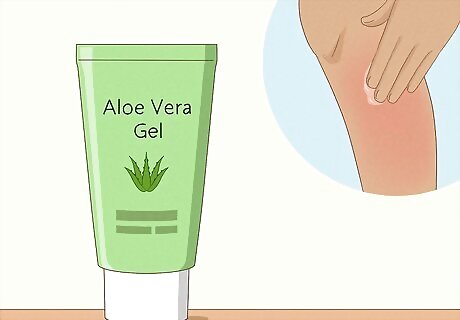
Massage aloe vera gel into your skin to help soothe it. Leave the gel on your skin for about 15 minutes, then rinse it off with warm water. You can repeat this process as many times as you want if it feels good on your skin. Instead of using the raw aloe vera gel straight from the aloe vera leaf, you could use a lotion with aloe vera, which you wouldn't have to rinse off.
Let the hair grow between waxes.
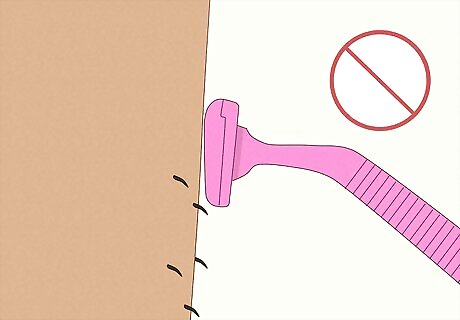
You're more likely to get ingrown hairs if you shave between waxes. Generally, waxing works better if you leave the hair alone in between waxes and just let it grow. Shaving between waxes disrupts the growth cycle, so you'll end up having to wait longer between appointments for your hair to grow to the appropriate length. Shaving also causes blunt ends on your hair, which will make it appear darker and thicker as it regrows.
Maintain a consistent waxing schedule.
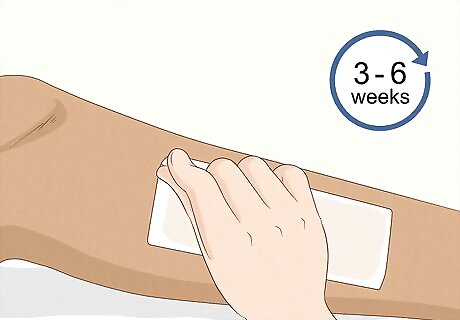
Once you start waxing, get waxed every 3-6 weeks. If you switch back and forth between hair removal methods or wait longer between waxes, you disrupt your hair's natural growth cycle and might end up with ingrown hairs. With a consistent waxing schedule, your hair will grow back finer and lighter after a few months. If you maintain a consistent waxing schedule for several months, you might also find that you're less prone to ingrown hairs than you were when you first started. Just remember—consistency is key!












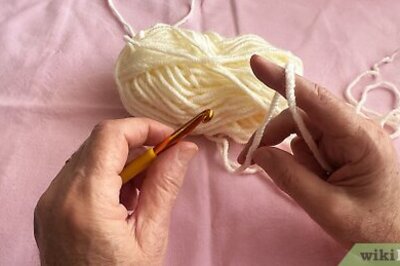





Comments
0 comment